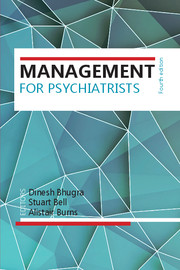Book contents
- Frontmatter
- Contents
- List of contributors
- List of figures, tables and boxes
- Preface
- Part I Theoretical overview
- Part II Changes and conflicts
- Part III Personal development
- 26 Compassionate care: leading and caring for staff of mental health services and the moral architecture of healthcare organisations
- 27 How to manage committees: running effective meetings
- 28 Presentation skills
- 29 Time management
- 30 Developing effective leaders in the National Health Service
- 31 Mental health informatics
- 32 Stress, burnout and engagement in mental health services
- 33 How to get the job you really want
- 34 Surviving as a junior consultant: hit the ground walking
- 35 Working with the media – many benefits but some risks
- 36 Consultant mentoring and mentoring consultants
- Index
34 - Surviving as a junior consultant: hit the ground walking
from Part III - Personal development
Published online by Cambridge University Press: 02 January 2018
- Frontmatter
- Contents
- List of contributors
- List of figures, tables and boxes
- Preface
- Part I Theoretical overview
- Part II Changes and conflicts
- Part III Personal development
- 26 Compassionate care: leading and caring for staff of mental health services and the moral architecture of healthcare organisations
- 27 How to manage committees: running effective meetings
- 28 Presentation skills
- 29 Time management
- 30 Developing effective leaders in the National Health Service
- 31 Mental health informatics
- 32 Stress, burnout and engagement in mental health services
- 33 How to get the job you really want
- 34 Surviving as a junior consultant: hit the ground walking
- 35 Working with the media – many benefits but some risks
- 36 Consultant mentoring and mentoring consultants
- Index
Summary
Whatever the quality of your higher specialist training, or the resourcefulness and resilience of your personality, the early years of your first substantive post as consultant psychiatrist will be a time of challenge and more than a little stress. Nothing can fully prepare you for this. Upon starting work, you will encounter a sudden hike in the range and complexity of your responsibilities, and the demands made of you by others, senior and junior, in terms of decisions, actions and calls for leadership and support. You will need to balance your responses to these demands against the seemingly ever-changing motives and agendas of countless other individuals from many backgrounds, clinical and managerial. Many of these people will be total strangers, and will bring with them all the unpredictable quirks and foibles that human nature is heir to. In the early months, you will also need to assimilate a large amount of critical, need-to-know information – names, places, forms, faces, phone numbers and so on – while at the same time handling a vast increase in seemingly less crucial information that reaches you, via meetings, phones, pigeonholes, text messages and emails. Much of this will prove useless; some of it will be invaluable. Few people will tell you which is which. Against this blooming, buzzing backdrop, you will also need to continue to practise the clinical psychiatry for which you have trained, and grapple with the ever-present problems of work in an under-resourced and stigmatised service. Occasionally, you will need to make quick decisions about high-risk situations, possibly involving suicide or even homicide, with incomplete information. If you have any energy left, you might even try to maintain a life outside work.
None of this need be half as forbidding as it sounds, provided that you think about these matters before and during the first months of the job. All of the key issues have been well described elsewhere in this book. It is useful to reiterate them here in a simple maxim: surviving as a junior consultant can be made easier – fun even – by looking after six things: objects, time, systems, information, people and yourself. Return to the opening of this chapter and see how these themes define that entire paragraph.
- Type
- Chapter
- Information
- Management for Psychiatrists , pp. 483 - 493Publisher: Royal College of PsychiatristsPrint publication year: 2016



